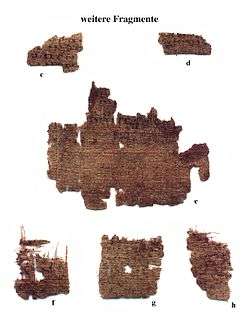Romans 7
| Romans 7 | |
|---|---|
|
Fragment c to h containing parts of the Epistle to the Romans in Papyrus 40, written about AD 250. | |
| Book | Epistle to the Romans |
| Bible part | New Testament |
| Order in the Bible part | 6 |
| Category | Pauline epistles |
Romans 7 is the seventh chapter of the Epistle to the Romans in the New Testament of the Christian Bible. It is authored by Paul the Apostle, but written by an amanuensis, Tertius, while Paul was in Corinth, in winter of AD 57-58.[1] Paul wrote to the Roman Christians in order to give them a substantial resume of his theology.[2]
Text
- The original text is written in Koine Greek.
- Some most ancient manuscripts containing this chapter are:
- Codex Vaticanus (AD 325-350)
- Codex Sinaiticus (AD 330-360)
- Codex Alexandrinus (ca. AD 400-440)
- Codex Ephraemi Rescriptus (ca. AD 450; complete)
- This chapter is divided into 25 verses.
Structure
The New King James Version organises this chapter as follows:
- Romans 7:1-6 = Freed from the Law
- Romans 7:7-12 = Sin’s Advantage in the Law
- Romans 7:13-25 = Law Cannot Save from Sin
The New International Version divides this chapter into two sections:
- Romans 7:1-6 = Released From the Law, Bound to Christ
- Romans 7:7-25 = The Law and Sin
Cross references
Lifelong authority of the Law
Writing to "those who know the [Jewish] Law, Paul says that the Law has authority over a man (only) [3] "as long as he lives" (Romans 7:1).
Jewish Christians in Rome would have been familiar with the Hebrew Bible but many commentators recognise that "the whole Roman Church, whether Jewish or Gentile, would be familiar with it; many of them having been disciples of the synagogue, and all being directed constantly to the use of the Old Testament by apostolic precept and example".[4] William Robertson Nicoll, however, argues that "neither Roman nor Mosaic law is specially referred to: the argument rests on the nature of law in general".[5]
Marriage provides an example:
- For the woman who has a husband is bound by the law to her husband as long as he lives. But if the husband dies, she is released from the law of her husband. (New King James Version) [6]
Verse 3
- So then if, while her husband lives, she marries another man, she will be called an adulteress; but if her husband dies, she is free from that law, so that she is no adulteress, though she has married another man.[7]
Verse 4
- Therefore, my brethren, you also have become dead to the law through the body of Christ, that you may be married to another — to Him who was raised from the dead, that we should bear fruit to God.[8]
The law provides knowledge of sin
Paul asks a rhetorical question in verse 7:
- Is the law sin?
- Certainly not! (Greek: μη γενοιτο, mē genoito), [9] he replies,
- But if it had not been for the Law, I would not have known (i.e. recognised) sin (New King James Version) or
- I would not have known what sin is really like (Contemporary English Version).[10]
Verse 25
- I thank God — through Jesus Christ our Lord!
- So then, with the mind I myself serve the law of God, but with the flesh the law of sin.[11]
See also
- Ten Commandments
- Torah
- Other related Bible parts: Exodus 20, Deuteronomy 5
References
- ↑ Halley, Henry H. Halley's Bible Handbook: an Abbreviated Bible Commentary. 23rd edition. Zondervan Publishing House 1962.
- ↑ Holman Illustrated Bible Handbook. Holman Bible Publishers, Nashville, Tennessee. 2012.
- ↑ "Only" is added, for example, by the New Century Version and New International Version
- ↑ Quote from Cambridge Bible for Schools and Colleges on Romans 7, but similar points are made by Heinrich Meyer (Meyer's NT Commentary) and Charles Ellicott (Ellicott's Commentary for Modern Readers)
- ↑ Expositor's Greek Testament on Romans 7, accessed 15 September 2016
- ↑ Romans 7:2
- ↑ Romans 7:3
- ↑ Romans 7:4
- ↑ See Romans 6#The Bearing of Justification by Grace upon a Holy Life
- ↑ Romans 7:7
- ↑ Romans 7:25
